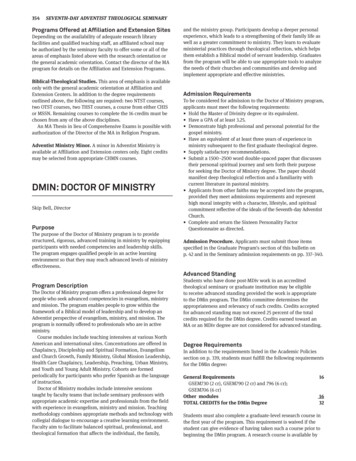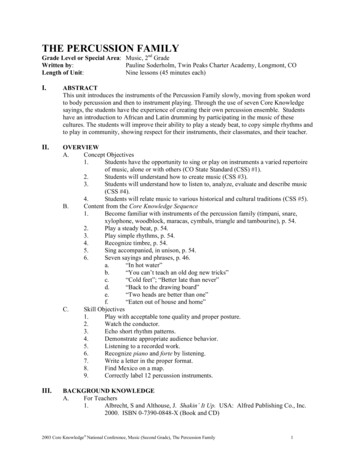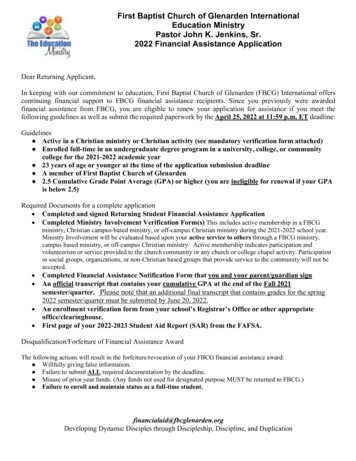
Transcription
MAKE IT COUNTA ten-week study for leadership teams by Influence magazineAvoiding Ministry Pitfalls:Lessons From 10 Biblical LeadersBy STEPHEN BLANDINODISCUSSION GUIDE
MAKE IT COUNTA 10-Week StudyFor LeadershipTeamsWhat IsMake It Count?Make It Countis a leadershipdevelopmentresource for use individually or with staff,volunteers, or boardmembers.Each installment isalso available online asa downloadable PDF,along with interactivepages for group member use. The underlinedwords and phrases inthe following text correspond to fill-in-theblank sections on teammember pages. Accessthese free resourcesat influencemagazine.com/Downloads.These lessons arewritten by StephenBlandino, lead pastorof 7 City Church in FortWorth, Texas, and theauthor of several books.I N T RO D U C T I O NAvoiding Ministry Pitfalls:Lessons From10 Biblical LeadersBy STEPHEN BLANDINOAccording to research conducted by author Steve Moore, thereare 1,181 leaders named in the Bible, and more than 13,000others who are mentioned but not named. In addition, Moorenotes there are 1,090 leadership conversations in Scripture.J. Robert Clinton suggests that of the biblical leaders on whom we haveenough information to follow their lives, approximately two-thirds didnot finish well.What lessons can we learn from the leaders in the Bible — whetherthey finished well or not? That’s the focus of this edition of MakeIt Count.
We’ll look at 10 biblical leaders and consider lessons we can glean from each of them.1. Joseph: Leading With God’s Favor. ThoughJoseph was tossed from one hardship to another,he experienced God’s favor. Favor is a sovereign act of God, but it is also something Josephlearned to position himself for throughout hislifetime.2. Joshua: Leading With Perspective. Joshua andCaleb were the only leaders who returned toMoses with a good report after exploring the landof Canaan. Forty years later, that same perspective gave Joshua the courage to lead God’s peopleinto the Promised Land.3. Deborah: Leading With Resolve. God usedDeborah to help lead Israel to a military victory.Afterward, Deborah praised God, saying, “Whenthe princes in Israel take the lead, when thepeople willingly offer themselves — praise theLord!” (Judges 5:2). Leaders lead in the face ofopposition.4. Nehemiah: Leading With Vision. WhenNehemiah heard about the condition of Jerusalem and its people, God birthed a vision inhis heart to return and rebuild the wall.5. Esther: Leading With Courage. Esther hadevery reason not to leverage her position forthe rescue of her people. Yet Esther ditchedthe excuses and courageously took action thatwould lead to their deliverance.6. Daniel: Leading With Cultural Influence.Daniel was an outsider, but God gave him greatinfluence under four different kings. By modeling commitment, character, competence,courage and consistency, Daniel positivelyinfluenced the culture of his day.7. Mary: Leading Through Devotion. Maryof Bethany led through devotion at the feet ofJesus. In that posture, Mary learned from Jesus,found comfort in Him, and offered worshipto Him.8. Priscilla and Aquila: Leading ThroughPartnership. The apostle Paul describedPriscilla and Aquila as “co-workers in Christ”(Romans 16:3). This couple understood thatleading through partnership provides encouragement, support and the ability to multiplyministry.9. Peter: Leading Through Failure. AlthoughPeter experienced multiple failures throughout his ministry with Jesus, the Lord restoredPeter. Effective leaders choose to own theirfailures, learn from them, and lead throughthem.10. Paul: Leading Through Hardship. Paulendured countless difficulties and intensepersecution, but he never quit. Paul’s example teaches us the value of endurance inleadership.As you read, reflect on, and apply these lessonswith your team, you’ll harvest insights that will equipyou to lead effectively and avoid common pitfallsin leadership.
MAKE IT COUNT1LEADERSHIP LESSONS FROM 10 BIBLICAL LEADERSJoseph: Leading With God’s FavorAssessWhat does it mean to experience God’s favor in leadership?Insights and IdeasJoseph experienced one hardship after another. From being sold into slavery by his brothers to spending years in a lonely prison, Joseph’s life was filled with suffering. Yet, in themidst of it all, Joseph encountered God’s favor.Author Steve Moore observed, “Giftedness and training are not enough; to be effective asleaders we need the favor of God.”But favor is a sovereign act of God. So, what can we do about it? Some people pray for favor,like Nehemiah did when he went to King Artaxerxes with his vision to rebuild the wall aroundJerusalem (Nehemiah 1:11). But Joseph took a different approach. He positioned himself forfavor. How? Moore suggests three ways:1. Joseph lived with purity. Potiphar’s wife tried to convince Joseph to sleep with her, butJoseph resisted time and again. Genesis 39:10 says, “Though she spoke to Joseph dayafter day, he refused to go to bed with her or even be with her.” Joseph passed the puritytest and maintained his integrity.2. Joseph grew his capacity. While gifts and abilities are not enough in leadership, westill have a responsibility to steward and grow those gifts to their full capacity. That wasJoseph’s approach. He proved faithful with his gifts, and God honored Joseph because ofit. Eventually, Joseph was elevated to second in command over Egypt.3. Joseph walked with humility. It’s easy to take credit for our leadership results, but Josephrecognized the value of humility. When Pharaoh was searching for someone to interprethis dream, Joseph said, “I cannot do it, but God will give Pharaoh the answer he desires”(Genesis 41:16).Nineteenth-century minister and writer Andrew Murray once said, “Faith and pride areenemies. Faith and humility are allies. We can never have more of genuine faith than we haveof genuine humility.”Joseph didn’t earn God’s favor, but God gave it to him. We need God’s favor today, andGod may choose to give it to us when we position our lives in a posture of purity, capacity andhumility.Reflect and Discuss1. Why is God’s favor so important for a leader?2. How does Joseph’s story inspire you to position your life for favor?3. Which of the three ways Joseph positioned himself for favor most speaks to you? Why?ApplyDo a self-audit on your life and leadership by reflecting on two questions: 1) How much do yourely on your own giftedness versus the favor of God? 2) What steps do you need to take to growin purity, capacity and humility?
MAKE IT COUNT1LEADERSHIP LESSONS FROM 10 BIBLICAL LEADERSJoseph: Leading With God’s FavorAssessWhat does it mean to you to experience God’s favor in leadership?Joseph experienced one hardship after another. From being sold into slavery by his brothers to spending years in a lonely prison, Joseph’s life was filled with suffering. Yet, in themidst of it all, Joseph encountered God’s favor.“Giftedness and training are not enough; to be effective as leaders we need the favor ofGod.” — Steve MooreHow Joseph positioned himself for God’s favor:1. Joseph lived with .“Though she spoke to Joseph day after day, he refused to go to bed with her or even bewith her” (Genesis 39:10).2. Joseph grew his .Joseph proved faithful with his gifts, and God honored him because of it. Eventually,Joseph was elevated to second in command over Egypt.3. Joseph walked with .“I cannot do it, but God will give Pharaoh the answer he desires” (Genesis 41:16).“Faith and pride are enemies. Faith and humility are allies. We can never have more ofgenuine faith than we have of genuine humility.” — Andrew MurrayApplyDo a self-audit on your life and leadership by reflecting on two questions: 1) How much doyou rely on your own giftedness versus the favor of God? 2) What steps do you need to taketo grow in purity, capacity and humility?
MAKE IT COUNT2LEADERSHIP LESSONS FROM 10 BIBLICAL LEADERSJoshua: Leading With PerspectiveTeam ReviewWhat did you learn as you reflected on positioning your life in a posture that attracts the favorof God?AssessHow does having the right perspective impact your effectiveness as a leader?Insights and IdeasOne of the most important qualities of a leader is perspective. Author Bobby Clintononce said, “The difference between leaders and followers is perspective. The differencebetween leaders and effective leaders is better perspective.”How you see is always more important than what you see.Joshua understood the value of perspective. When the 12 spies came back to Moses withtheir report after spending 40 days exploring the land of Canaan, they described the beautyand bounty of the land. However, 10 of the spies also said, “But the people who live there arepowerful, and the cities are fortified and very large” (Numbers 13:28).Then, when Joshua and Caleb wanted to take the land, the 10 spies countered, “We can’tattack those people; they are stronger than we are. We seemed like grasshoppers in our owneyes, and we looked the same to them” (Numbers 13:31,33).What’s the value of having the right perspective in leadership? Consider three benefits:1. The right perspective helps us glean lessons. When we find ourselves in difficult situations, it’s easy to become so focused on getting out of them that we fail to get anythingfrom them. Our perspective becomes skewed, and we lose the lesson in the middle of ourloathing. The giant might be what you see, but how you see it determines whether youseize the opportunity before you.2. The right perspective increases our faith in God. A.W. Tozer believed a low view of God isthe cause of a hundred lesser evils, but a high view of God is the solution to 10,000 temporal problems. In other words, our biggest problem may not be what we see, but how wesee it.3. The right perspective helps us make better decisions. Rather than being reactionary inour decision making, perspective helps us see further and respond with greater wisdom.It gives us the insight to seek long-term solutions rather than short-term relief.This kind of perspective gave Joshua what he would need to lead the Israelites into thePromised Land after Moses’ death.Reflect and Discuss1. What most strikes you about the story of the 12 spies?2. How have you allowed your perspective of your problems to skew your perspective of God?3. Brainstorm three ways you and your team can gain better perspective in leadership.ApplyCreate two columns. In one column, list the qualities of a problem-focused perspective; in theother, list the qualities of a God-focused perspective. Then, read the God-focused perspectiveeach morning for the next 30 days. As you do, reflect on how it impacts your view of God andleadership.
MAKE IT COUNT2LEADERSHIP LESSONS FROM 10 BIBLICAL LEADERSJoshua: Leading With PerspectiveAssessHow does having the right perspective impact your effectiveness as a leader?One of the most important qualities of a leader is perspective. Author Bobby Clinton oncesaid, “The difference between leaders and followers is perspective. The difference betweenleaders and effective leaders is better perspective.”How you see is always more important than what you see.“But the people who live there are powerful, and the cities are fortified and very large”(Numbers 13:28).“We can’t attack those people; they are stronger than we are. We seemed like grasshoppers in our own eyes, and we looked the same to them” (Numbers 13:31,33).Three benefits of the right perspective:1. The right perspective helps us glean .When we find ourselves in difficult situations, it’s easy to become so focused on gettingout of them that we fail to get anything from them.2. The right perspective increases our in God.A.W. Tozer believed a low view of God is the cause of a hundred lesser evils, but a highview of God is the solution to 10,000 temporal problems.3. The right perspective helps us make better .Rather than being reactionary in our decision making, perspective helps us see furtherand respond with greater wisdom.ApplyCreate two columns. In one column, list the qualities of a problem-focused perspective;in the other, list the qualities of a God-focused perspective. Then, read the God-focusedperspective each morning for the next 30 days. As you do, reflect on how it impacts yourview of God and leadership.
MAKE IT COUNT3LEADERSHIP LESSONS FROM 10 BIBLICAL LEADERSDeborah: Leading With ResolveTeam ReviewHow is your outlook improving as you read the qualities of a God-focused perspective?AssessWhat’s the hardest part of leadership for you?Insights and IdeasDeborah was a judge and prophet. In Judges 4:6–7, she delivered this message to Barak,son of Abinoam: “The Lord, the God of Israel, commands you: ‘Go, take with you tenthousand men of Naphtali and Zebulum and lead them up to Mount Tabor. I will lead Sisera,the commander of Jabin’s army, with his chariots and his troops to the Kishon River and givehim into your hands.’”Deborah didn’t just sit on the sidelines, however. She ultimately stepped into battle, andJabin, king of Canaan, was destroyed.After this victory, Deborah rejoiced with song: “When the princes in Israel take the lead,when the people willingly offer themselves — praise the Lord!” (Judges 5:2).Leaders lead when the pressure is on. This is especially important in three critical moments:1. Leaders lead in the face of fear. Author Clay Scroggins observed, “Every time we respondin fear, we miss an opportunity to lead, and this failure of leadership is an issue of identity.” Deborah’s identity was established in the Lord, and with bold resolve, she enteredthe battle and led in the face of fear.2. Leaders lead in the face of pain. Author and consultant Sam Chand says, “You’ll growonly to the threshold of your pain.” That means when you face difficult and painful decisions, you have to lean forward and lead forward. That’s what Deborah did. Despite thepain associated with battle, Deborah chose to boldly lead as she told Barak, “Go!” (Judges4:14).3. Leaders lead in the face of battle. Deborah said to Barak, “This is the day the Lord hasgiven Sisera into your hands. Has not the Lord gone ahead of you?” (Judges 4:14). Withthat, 10,000 warriors followed them to the battle. When it was over, not a single memberof the enemy army was left alive (Judges 4:16).We are in a spiritual battle, and when faced with resistance and opposition, leaders do notretreat or relinquish the victory. They lead when the stakes are high, looking to the Lord togive them the victory.John Maxwell often says, “Leaders don’t have two good days in a row.” Whether good orbad, leaders lead every day. They step up and step out, and they steward their leadership forthe good of others and the glory of God.Reflect and Discuss1. What does the statement “leaders lead” mean to you?2. In which situation is it hardest for you to lead: in fear, pain or spiritual battles? Why?3. In what area of your ministry have you been hesitant to lead with courage?ApplyTake a moment to pinpoint the area where you need to stand up and step out to lead. Then,determine the first step you’ll take to lead forward, and when you’ll take it. Finally, pray andcommit to follow God’s lead in this critical moment.
MAKE IT COUNT3LEADERSHIP LESSONS FROM 10 BIBLICAL LEADERSDeborah: Leaders LeadAssessWhat’s the hardest part of leadership for you?Deborah was a judge and prophet. In Judges 4:6–7, she delivered this message to Barak,son of Abinoam: “The Lord, the God of Israel, commands you: ‘Go, take with you ten thousand men of Naphtali and Zebulum and lead them up to Mount Tabor. I will lead Sisera,the commander of Jabin’s army, with his chariots and his troops to the Kishon River andgive him into your hands.’”Leaders lead in three critical moments:1. Leaders lead in the face of .“Every time we respond in fear, we miss an opportunity to lead, and this failure ofleadership is an issue of identity.” — Clay Scroggins2. Leaders lead in the face of .“You’ll grow only to the threshold of your pain.” — Sam ChandWhen you face difficult and painful decisions, you have to lean forward and leadforward. That’s what Deborah did.3. Leaders lead in the face of .When faced with resistance and opposition, leaders do not retreat or relinquish thevictory. They lead when the stakes are high, looking to the Lord to give them thevictory.ApplyTake a moment to pinpoint the area where you need to stand up and step out to lead. Then,determine the first step you’ll take to lead forward, and when you’ll take it. Finally, prayand commit to follow God’s lead in this critical moment.
MAKE IT COUNT4LEADERSHIP LESSONS FROM 10 BIBLICAL LEADERSNehemiah: Leading With VisionTeam ReviewWhat step have you taken in the past week to lead in the face of fear, pain or spiritual battle?AssessWhat vision are you leading toward right now?Insights and IdeasLeadership is all about leading people to a better and brighter future. Author Michael Hyattobserved, “Vision, as I see it, is a clear, inspiring, practical and attractive picture of yourorganization’s future.”With vision, leaders take people into a God-inspired tomorrow. Nobody knew this betterthan Nehemiah.Vision came alive in Nehemiah’s heart when he asked Hanani and some other men aboutthe Jews and the condition of Jerusalem. They said, “Those who survived the exile and areback in the province are in great trouble and disgrace. The wall of Jerusalem is broken down,and its gates have been burned with fire” (Nehemiah 1:3).When Nehemiah heard these words, he wept and prayed. In fact, the prayer recorded inNehemiah 1:5–11 is believed to be a summary of what Nehemiah prayed over the next fourmonths before he finally appeared before King Artaxerxes with a vision to rebuild the wallaround Jerusalem. From Nehemiah’s vision, we discover three important truths for leaders:1. Vision is the solution to a problem. The stimulus for the formation of Nehemiah’s visionwas the question he asked Hanani and the other men. That single question presented aproblem — a people in disgrace and a city in ruins. With that question, a vision was bornfor a people with dignity and a city with walls.What problem does your vision solve?2. Vision is spiritual, emotional and practical. Nehemiah’s vision was spiritual. It cameabout through prayer and fasting. Nehemiah’s vision was emotional. He wept andmourned for days. And Nehemiah’s vision was practical. It addressed a real need.What about your vision? Is it spiritually inspired, emotionally engaging, and practicallyhelpful?3. Vision requires the help of God. If vision can be realized solely in your strength and wisdom, your vision may not be from God. As Nehemiah prayed, he knew he needed theking’s help. So, what did Nehemiah do? He prayed to the Lord, “Give your servant success today by granting him favor in the presence of this man” (Nehemiah 1:11). And Godanswered Nehemiah’s prayer by giving him the permission and resources he needed sothe vision could move forward.Leaders lead with vision. They allow the Holy Spirit to birth a picture of a brighter future intheir soul, and then they courageously pursue it.Reflect and Discuss1. What problem does your vision solve?2. Which is weakest in your vision: the spiritual, emotional or practical aspect?3. How are you seeking God’s help to see your vision fulfilled?ApplyTake some time to reflect on your vision for your area of ministry. Do you need to dream bigger? Is your vision spiritual, emotional and practical? Does your vision meet a specific need orsolve a specific problem? Take some time to prayerfully answer these questions and allow theLord to form a clearer vision within your heart.
MAKE IT COUNT4LEADERSHIP LESSONS FROM 10 BIBLICAL LEADERSNehemiah: Leading With VisionAssessWhat vision are you leading toward right now?“Vision, as I see it, is a clear, inspiring, practical, and attractive picture of your organization’s future.” — Michael Hyatt“Those who survived the exile and are back in the province are in great trouble and disgrace. The wall of Jerusalem is broken down, and its gates have been burned with fire”(Nehemiah 1:3).When Nehemiah heard these words, he wept and prayed. After four months, he finallyappeared before King Artaxerxes with a vision to rebuild the wall around Jerusalem.Three truths regarding vision:1. Vision is the to a problem.The stimulus for the formation of Nehemiah’s vision was the question he askedHanani. That single question presented a problem — a people in disgrace and a city inruins.2. Vision is,and .Nehemiah’s vision was spiritual. It came about through prayer and fasting. Nehemiah’s vision was emotional. He wept and mourned for days. And Nehemiah’s vision waspractical. It addressed a real need.3. Vision requires the of God.“Give your servant success today by granting him favor in the presence of this man”(Nehemiah 1:11).ApplyTake some time to reflect on your vision for your area of ministry. Do you need to dreambigger? Is your vision spiritual, emotional and practical? Does your vision meet a specificneed or solve a specific problem? Take some time to prayerfully answer these questionsand allow the Lord to form a clearer vision within your heart.
MAKE IT COUNT5LEADERSHIP LESSONS FROM 10 BIBLICAL LEADERSEsther: Leading With CourageTeam ReviewHow has your vision become sharper and bolder?AssessWhat difference does courage make in leadership?Insights and IdeasEsther’s story is an amazing journey of God raising up an orphan girl to deliver Hispeople. It all started when Esther courageously risked everything to go before the king andreveal Haman’s evil plot to have the Jews annihilated. She led courageously, and God honoredEsther’s faith.From Esther’s story, we discover three important lessons about the importance of couragein leadership:1. Courage confronts your resistance. When Mordecai challenged Esther to plead the caseof the Jews before the king, she said, “All the king’s officials and the people of the royalprovinces know that for any man or woman who approaches the king in the inner courtwithout being summoned the king has but one law: that they be put to death unless theking extends the gold scepter to them and spares their lives. But thirty days have passedsince I was called to go to the king” (Esther 4:11).But Mordecai wouldn’t take “no” for an answer, and eventually Esther found the courage to confront her excuses before her excuses turned into disobedience.2. Courage is connected to your calling. Mordecai went on to tell Esther, “Do not think thatbecause you are in the king’s house you alone of all the Jews will escape. For if you remainsilent at this time, relief and deliverance for the Jews will arise from another place, butyou and your father’s family will perish. And who knows but that you have come to yourroyal position for such a time as this?” (Esther 4:13–14).We are not courageous for the sake of normalcy or complacency. Courage is only neededwhen God calls us into a better tomorrow. Courage is for such a time as this.3. Courage compels you to take action. Author Lance Witt observed, “Courage is not anissue of wiring, but of willingness. It’s not an issue of DNA, but of heart.”When you have the willingness and heart, you’ll do more than make incremental tweaksor slight adjustments. Instead, you’ll muster the bravery to take initiative on a bold idea.That’s what Esther did, and delivery came to the Jewish people.Leading with courage doesn’t feel natural, but it is essential. It’s the difference betweendreaming and doing. It’s the difference between talk and action.Reflect and Discuss1. What resistance are you facing right now that is trying to snuff out your courage?2. How does your calling require courage?3. What courageous action do you need to take this week to move forward with the call orvision God has birthed in your heart?ApplyCraft a plan to feed your courage and starve your fears. Your plan might include focusing onGod, surrounding yourself with positive people, and meditating on the truths of Scripture.Once you create your plan, revisit it for a few minutes each day to help you cultivate thecourage to take action.
MAKE IT COUNT5LEADERSHIP LESSONS FROM 10 BIBLICAL LEADERSEsther: Leading With CourageAssessWhat difference does courage make in leadership?Esther’s story is an amazing journey of God raising up an orphan girl to deliver His people.Courage and leadership lessons from Esther:1. Courage confronts your .“All the king’s officials and the people of the royal provinces know that for any man orwoman who approaches the king in the inner court without being summoned the kinghas but one law: that they be put to death unless the king extends the gold scepter tothem and spares their lives. But thirty days have passed since I was called to go to theking” (Esther 4:11).2. Courage is connected to your .“Do not think that because you are in the king’s house you alone of all the Jews willescape. For if you remain silent at this time, relief and deliverance for the Jews willarise from another place, but you and your father’s family will perish. And who knowsbut that you have come to your royal position for such a time as this?” (Esther 4:13–14).3. Courage compels you to take .“Courage is not an issue of wiring, but of willingness. It’s not an issue of DNA, but ofheart.” — Lance WittApplyCraft a plan to feed your courage and starve your fears. Your plan might include focusingon God, surrounding yourself with positive people, and meditating on the truths of Scripture. Once you create your plan, revisit it for a few minutes each day to help you cultivatethe courage to take action.
MAKE IT COUNT6LEADERSHIP LESSONS FROM 10 BIBLICAL LEADERSDaniel: Leading With Cultural InfluenceTeam ReviewHow has your courage grown as you’ve fed your faith?AssessWhat does it look like for followers of Jesus to influence culture?Insights and IdeasWhether it’s in business, education, government, arts, media, science, the Church, or thesocial sector, God is raising up leaders in every channel of culture to use their influenceto meet needs, solve problems, and make a difference.Daniel was a man who led with cultural influence in the midst of a culture that was hostile toward God. What was his secret? Daniel 6:3 says, “Now Daniel so distinguished himselfamong the administrators and the satraps by his exceptional qualities that the king plannedto set him over the whole kingdom.”How exactly did Daniel distinguish himself? Here are five qualities:1. Commitment. After King Darius decided to elevate Daniel over his entire kingdom, Daniel’s fellow administrators and satraps tried to find grounds to discredit him. But aftercareful consideration, they said, “We will never find any basis for charges against thisman Daniel unless it has something to do with the law of his God” (Daniel 6:5). And whenan edict was issued to pray solely to King Darius, Daniel continued to pray to God threetimes a day (Daniel 6:10). Daniel demonstrated uncompromising commitment to God.2. Character. Daniel 1:8 says, “But Daniel resolved not to defile himself with the royal foodand wine, and he asked the chief official for permission not to defile himself this way.”Rather than eating food that had been offered to idols, Daniel maintained his characterand integrity. Moral conviction superseded momentary convenience.3. Competence. Daniel possessed “aptitude for every kind of learning,” and he was “quick tounderstand” (Daniel 1:4). Furthermore, “In every matter of wisdom and understandingabout which the king questioned them, he found them ten times better than all the magicians and enchanters in his whole kingdom” (Daniel 1:20). Simply put, Daniel exhibitedthe highest levels of competence. He led with excellence.4. Courage. When Daniel interpreted the handwriting on the wall for King Belshazzar, hehad the courage to speak the truth (Daniel 5:25–28). And when King Darius issued hisnarcissistic prayer challenge, Daniel had the courage to remain faithful to God (Daniel6:10–11).5. Consistency. Daniel modeled these qualities consistently, from the time he was 16 yearsold until he was in his 80s. As a result, Daniel slowly built influence step by step, day byday, year by year, and choice by choice.Reflect and Discuss1. What most inspires you about Daniel’s story?2. Which of the five qualities in Daniel’s life and leadership most challenge you?3. What would it look like for you to lead with cultural influence today?ApplyDo an honest evaluation of the five qualities Daniel modeled. To which ones do you mostneed to give attention? How could you intentionally grow in these qualities? How might suchgrowth make you more effective for Christ in today’s culture?
MAKE IT COUNT6LEADERSHIP LESSONS FROM 10 BIBLICAL LEADERSDaniel: Leading With Cultural InfluenceAssessWhat does it look like for followers of Jesus to influence culture?“Now Daniel so distinguished himself among the administrators and the satraps by hisexceptional qualities that the king planned to set him over the whole kingdom” (Daniel 6:3).How did Daniel distinguish himself?1. .“We will never find any basis for charges against this man Daniel unless it has something to do with the law of his God” (Daniel 6:5).2. .“But Daniel resolved not to defile himself with the royal food and wine, and he askedthe chief official for permission not to defile himself this way” (Daniel 1:8).3.Daniel possessed “aptitude for every kind of learning,” and he was “quick to understand” (Daniel 1:4). Furthermore, “In every matter of wisdom and understandingabout which the king questioned them, he found them ten times better than all themagicians and enchanters in his whole kingdom” (Daniel 1:20).4. .When Daniel interpreted the handwriting on the wall for King Belshazzar, he had thecourage to speak the truth (Daniel 5:25–28). And when King Darius issued his narcissistic prayer challenge, Daniel had the courage to remain faithful to God (Daniel6:10–11).5
Author Bobby Clinton once said, "The difference between leaders and followers is perspective. The difference between leaders and effective leaders is better perspective." How you see is always more important than what you see. Joshua understood the value of perspective. When the 12 spies came back to Moses with










